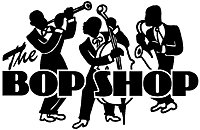
Phil's previous posting on the Bop Shop caused me as well to ponder the store's contribution to Rochester's musical culture. Since I have my own extensive history with the place, I thought I'd throw in my two cents. As Phil pointed out, the store is one of the hippest record shops anywhere. The owner, Tom Kohn, is simply put, a visionary. He has wide-ranging, yet discriminating taste, and an incredible memory for record minutiae. The Bop Shop's main focus has always been on jazz, folk and blues, but with many other genres represented as well. What you won't find is current pop, or anything that Tom deems unworthy of his store. (Ages ago I remember the look of astonishment on a Japanese tourist customer's face when Tom informed him that he didn't carry the latest Michael Jackson release. Many of Kenny G's fans were likewise astonished to learn that Mr. G's highly popular recordings did not make the cut either.) Over the years, his store's presence has had an incalculable effect on the Rochester scene, providing exceptional selection for music enthusiasts, sponsoring dozens of free concerts and offering a forum for musicians learn and grow.
I met Tom in 1980 when we were both electronic technicians at MXR Innovations, Rochester's guitar effect and sound-reinforcement gear manufacturer. Tom and I were there during the company's golden age; it was a really fun place to work back when they were prosperous. By 1982-83 the Japanese corporations like Roland and Yamaha had made huge inroads into that market and MXR struggled to compete. This, combined with some terrible, cocaine-addled management decisions brought the company to its demise around '84. By mid-83 we all saw the writing on the wall, and Tom had taken his profit-sharing and started the Bop Shop at the Village Gate Square, 274 North Goodman Street in Rochester. Back then it was called Peddler's Village, and was more or less a glorified flea market. Even then, Tom was one of the most successful vendors there. At this point, twenty-some years later, his is probably the only business left from that era.
In 1983, I got married and started working on a music degree at Nazareth College. A few months later, I stopped by the Village Gate and poked around Tom's new little retail space. We hadn't spoken in a while, and he told me that things were busy and he was thinking about hiring an employee. I became the first one. At the time I thought little of it; today it seems like quite a big deal. The place expanded rapidly, quadrupling in size over the next few years. Today the store is rated one of the finest jazz record stores in the country and it serves customers all over the world. And the fact that it has simply survived through these tumultous years is remarkable. Few independent record stores have been able to do so, and fewer still on the terms that Tom demanded.
The store had an enormous impact on my own musical education. Whatever I have learned from my coursework and lessons over the years, I have learned far more about musical style, artists and repertoire from my years of working at the Bop Shop, and later managing its sister store, Recorded Classics. All of Tom's employees were (and remain) musicians and/or music lovers with tremendous knowledge. We all had different interests, but we tended to get along well and to learn from one another. A day at the store would involve listening to dozens of recordings while we went about our duties, all with vigorous discussion. The store was like a huge library, and we all absorbed its contents as much as we could. We were some of its best customers, as well as its employees. This influenced the way we played, the bands we played in, the way we thought about music altogether. After I started playing in CbJE, the Bop Shop was where I expanded my listening, to fill in the gaps of musical history I needed. Bob Dylan, Blind Willie McTell, and Cannon's Jug Stompers became essential listening. I studied the sax solos of Herbert Hardesty, the great tenor man for Fats Domino, and the solos on Little Richard's early recordings. I tried to figure out a way to make my saxophone sound like Hubert Sumlin's guitar on Howlin' Wolf's records. (Still working on that one....) John Coltrane, Albert Ayler, Cecil Taylor and Anthony Braxton became role models. Steve Lacy shaped my concept of how to play the soprano saxophone. And Sidney Bechet showed me sounds from the clarinet I'd never dreamed of...
I stopped working for Tom in 1992, when I went back to school for my master's degree, but I still shop at the Bop Shop whenever I'm in Rochester. Tom always pulls out a dozen discs to play me, ("Dave, y'gotta hear these guys, they're amazing!!!") and yes, they always are amazing. My credit card groans under the strain and I ponder how I'll get it all into my luggage, but I go forth happy that I have the best, most latest sounds that have been made. Stop by there yourself, if you don't believe me.

No comments:
Post a Comment